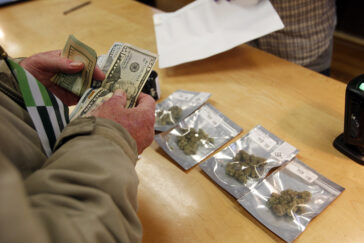Beat of the Week
(Honorable Mention)
AP: Some chiropractors profiteering, undermining vaccines
joined forces to document anti-vaccine activism among a vocal group of chiropractors.Rhode Island-based reporter Smith has been closely tracking anti-vaccine activists. That diligence paid off with a story on a group of influential chiropractors who are becoming leading voices against vaccines and coronavirus safety measures. They’re making money by peddling alternatives as they work to weaken vaccine-related state laws and policies across the U.S., undermining one of the key tools in fighting the pandemic.
The report by Smith and statehouse reporters Bauer in Madison, Wisconsin, and Catalini in Trenton, New Jersey, spotlighted an industry that has had little scrutiny during the pandemic. It started out as a tip: Chiropractors attending an anti-vaccine conference in Wisconsin had earned continuing education credits valid toward their licenses. It reminded Smith that a group lobbying against vaccines, Stand for Health Freedom, had been co-founded with chiropractors.The trio scoured public databases to find states allowing CE credits for the anti-vaccine conference, dug up chiropractic board meeting minutes, tracked down statehouse testimony and public comment by chiropractors in numerous states, reviewed news reports and mined digital tools along with interviews of chiropractors, lawmakers and public health advocates to establish that:
— 10 states gave CE credits for the anti-vaccine conference, and that it brought in tens of thousands of dollars in revenue to the chiropractic group and college that sponsored it— Chiropractors have worked to influence vaccine-related legislation and policy in at least 24 states since 2019; a chiropractor-backed group running several lobbying campaigns has never registered as a lobbyist— Dozens of chiropractors use their websites to discourage patients from getting vaccines— Chiropractors are advertising on Facebook and Instagram to sell anti-vaccine products— A California chiropractic group raised $545,000 for anti-vaccine activist Robert F. Kennedy Jr.— Chiropractic professional groups have taken anti-vaccine stands, including one now run by a longtime anti-vaccine activisthttps://aplink.news/z1m















